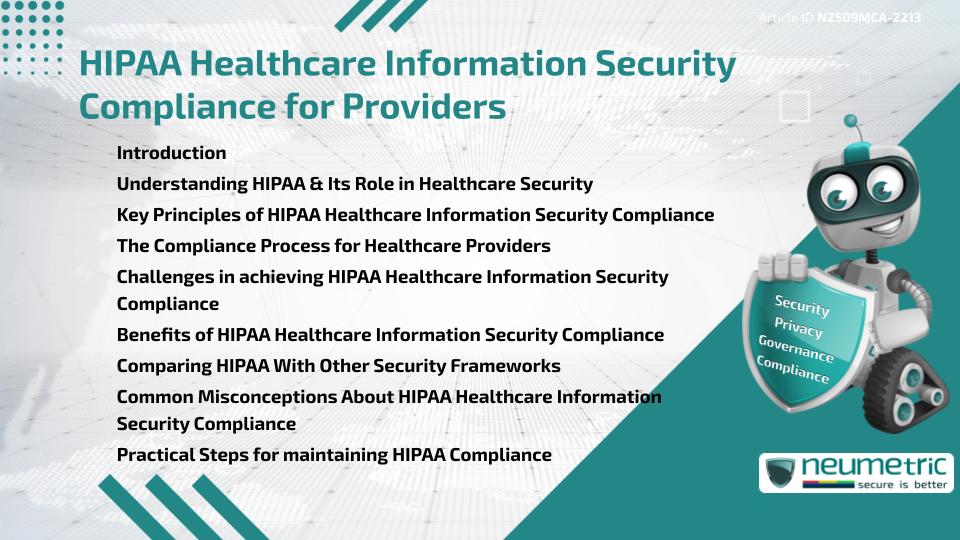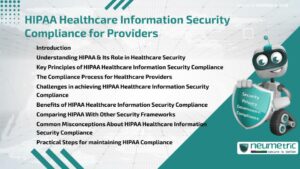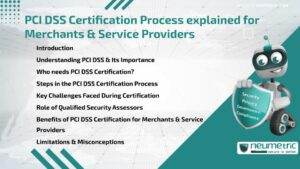Table of Contents
ToggleIntroduction
HIPAA Healthcare Information Security compliance is a critical requirement for providers that handle Patient Data in the United States. Established under the Health Insurance Portability & Accountability Act [HIPAA], this Framework ensures that protected health information [PHI] is properly safeguarded against unauthorized access, loss or misuse. Providers must comply with strict administrative, physical & technical safeguards to protect patient Privacy. While compliance can be complex & resource-intensive, it enhances Data Security, reduces Risk & strengthens trust between patients & Healthcare Organisations. This article explores the principles, processes, challenges, benefits & misconceptions surrounding HIPAA Healthcare Information Security compliance.
Understanding HIPAA & Its Role in Healthcare Security
HIPAA was enacted in 1996 to improve Healthcare efficiency & protect patient information. Over time, it evolved into a comprehensive Framework governing how PHI is stored, transmitted & accessed. The HIPAA Security Rule specifically requires providers to adopt measures that ensure the confidentiality, integrity & availability of electronic PHI. For Healthcare providers, HIPAA Healthcare Information Security compliance is not optional but a legal requirement, with violations potentially leading to Financial penalties & reputational harm.
Key Principles of HIPAA Healthcare Information Security Compliance
The foundation of HIPAA compliance lies in three types of safeguards:
- Administrative safeguards: Policies, Risk analyses & workforce training.
- Physical safeguards: Facility Access Controls, workstation security & device management.
- Technical safeguards: Access Controls, Audit logs, encryption & authentication mechanisms.
These safeguards work together to ensure that Patient Data remains protected in all forms, whether stored on a server, shared via email or accessed through medical devices.
The Compliance Process for Healthcare Providers
Achieving HIPAA Healthcare Information Security compliance involves a structured process:
- Risk Assessment: Identifying Vulnerabilities in data handling.
- Policy development: Establishing rules for protecting PHI.
- Implementation of safeguards: Applying technical & physical measures.
- Training: Ensuring staff understand compliance responsibilities.
- Ongoing monitoring: Conducting audits & addressing potential violations.
Providers must also prepare for audits by regulatory authorities, who may request documentation & Evidence of compliance practices.
Challenges in achieving HIPAA Healthcare Information Security Compliance
Compliance is not without obstacles. Providers often face challenges such as limited resources, rapidly changing technology & the complexity of integrating electronic health records across multiple systems. Small practices may struggle with the cost of compliance programs, while large Organisations must coordinate compliance across diverse departments. Human error, such as improper handling of data or failure to follow procedures, remains one of the greatest Risks.
Benefits of HIPAA Healthcare Information Security Compliance
Despite its demands, HIPAA compliance delivers significant benefits. It strengthens patient trust by showing a commitment to safeguarding Sensitive Information. It reduces the Risk of costly data breaches & legal penalties. Compliance also improves operational efficiency by enforcing standardised Policies & practices across the Organisation. Furthermore, by aligning with HIPAA requirements, providers demonstrate accountability that can enhance their reputation in a competitive Healthcare market.
Comparing HIPAA With Other Security Frameworks
HIPAA differs from other security frameworks in its Healthcare-specific focus. For example, ISO 27001 offers a broad international Standard for Information Security management, while HIPAA is tailored to protecting PHI. SOC 2 emphasizes service organisation controls but does not address Healthcare regulations directly. FedRAMP applies to federal cloud services, not Healthcare providers. By contrast, HIPAA Healthcare Information Security compliance is mandatory & highly prescriptive, leaving little room for flexibility.
Common Misconceptions About HIPAA Healthcare Information Security Compliance
Several misconceptions can complicate compliance. Some providers mistakenly believe that small practices are exempt, but HIPAA applies regardless of size. Others assume that purchasing secure technology guarantees compliance, when in reality Policies, training & monitoring are equally important. Another common misconception is that compliance is a one-time project, when it actually requires continuous updates & regular assessments.
Practical Steps for maintaining HIPAA Compliance
To maintain HIPAA Healthcare Information Security compliance, providers should:
- Conduct annual Risk Assessments.
- Train staff regularly on compliance responsibilities.
- Encrypt Sensitive Data in transit & at rest.
- Establish clear Incident Response procedures.
- Document all compliance-related activities.
Providers may also consult resources from the National Institute of Standards & Technology (NIST) for aligning technical safeguards with Best Practices.
Conclusion
HIPAA Healthcare Information Security compliance is essential for providers to protect Patient Data & maintain legal accountability. Though demanding, the process strengthens trust, reduces Risk & enhances organizational resilience. Providers who commit to HIPAA compliance are better equipped to navigate the complexities of modern Healthcare.
Takeaways
- HIPAA safeguards Patient Data through administrative, physical & technical controls.
- Compliance requires Risk Assessments, training & Continuous Monitoring.
- Challenges include resource limitations, evolving technology & human error.
- Benefits include trust, legal protection & operational efficiency.
- Misconceptions often lead to compliance gaps if not addressed.
FAQ
What is HIPAA Healthcare Information Security compliance?
It is a Framework requiring Healthcare providers to safeguard Patient Data through strict administrative, physical & technical controls.
Who must comply with HIPAA?
All Healthcare providers, health plans & business associates that handle protected health information must comply with HIPAA.
What are the penalties for HIPAA violations?
Penalties can range from Financial fines to legal action, depending on the severity & intent of the violation.
How often should Risk Assessments be conducted?
Risk Assessments should be performed at least annually & whenever significant changes occur in technology or operations.
Does HIPAA apply to electronic communications?
Yes, HIPAA requires providers to secure electronic communications, including email, that involve patient information.
Is HIPAA compliance a one-time effort?
No, it requires ongoing monitoring, staff training & updates to Policies & safeguards.
How does HIPAA differ from SOC 2 or ISO 27001?
HIPAA is mandatory & Healthcare-specific, while SOC 2 & ISO 27001 are broader frameworks that apply to various industries.
Need help for Security, Privacy, Governance & VAPT?
Neumetric provides organisations the necessary help to achieve their Cybersecurity, Compliance, Governance, Privacy, Certifications & Pentesting needs.
Organisations & Businesses, specifically those which provide SaaS & AI Solutions in the Fintech, BFSI & other regulated sectors, usually need a Cybersecurity Partner for meeting & maintaining the ongoing Security & Privacy needs & requirements of their Enterprise Clients & Privacy conscious Customers.
SOC 2, ISO 27001, ISO 42001, NIST, HIPAA, HECVAT, EU GDPR are some of the Frameworks that are served by Fusion – a SaaS, multimodular, multitenant, centralised, automated, Cybersecurity & Compliance Management system.
Neumetric also provides Expert Services for technical security which covers VAPT for Web Applications, APIs, iOS & Android Mobile Apps, Security Testing for AWS & other Cloud Environments & Cloud Infrastructure & other similar scopes.
Reach out to us by Email or filling out the Contact Form…





